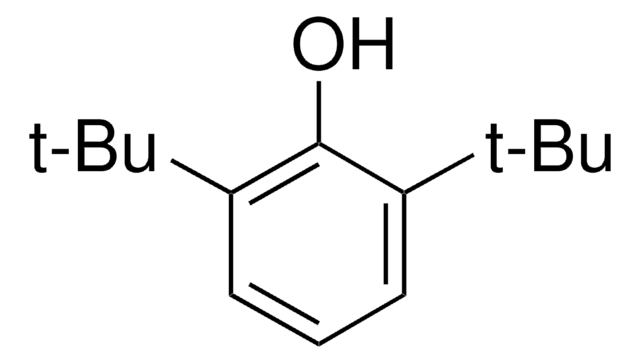137731
2,4-Di-tert-butylphenol
99%
Sinónimos:
2,4-Bis(1,1-dimethylethyl)phenol, 2,4-Bis(tert-butyl)phenol, 2,4-Di-tert-butylhydroxybenzene, 2,4-Ditert-butylphenol
About This Item
Productos recomendados
presión de vapor
1 mmHg ( 84.5 °C)
Nivel de calidad
Análisis
99%
formulario
solid
bp
265 °C (lit.)
mp
53-56 °C (lit.)
solubilidad
water: soluble 0.033 g/L at 25 °C
cadena SMILES
CC(C)(C)c1ccc(O)c(c1)C(C)(C)C
InChI
1S/C14H22O/c1-13(2,3)10-7-8-12(15)11(9-10)14(4,5)6/h7-9,15H,1-6H3
Clave InChI
ICKWICRCANNIBI-UHFFFAOYSA-N
Información sobre el gen
human ... GABRA1(2554)
¿Está buscando productos similares? Visita Guía de comparación de productos
Categorías relacionadas
Descripción general
Aplicación
Palabra de señalización
Danger
Frases de peligro
Consejos de prudencia
Clasificaciones de peligro
Aquatic Acute 1 - Aquatic Chronic 1 - Eye Dam. 1 - Skin Irrit. 2
Código de clase de almacenamiento
8A - Combustible corrosive hazardous materials
Clase de riesgo para el agua (WGK)
WGK 2
Punto de inflamabilidad (°F)
239.0 °F - closed cup
Punto de inflamabilidad (°C)
115 °C - closed cup
Equipo de protección personal
dust mask type N95 (US), Eyeshields, Gloves
Certificados de análisis (COA)
Busque Certificados de análisis (COA) introduciendo el número de lote del producto. Los números de lote se encuentran en la etiqueta del producto después de las palabras «Lot» o «Batch»
¿Ya tiene este producto?
Encuentre la documentación para los productos que ha comprado recientemente en la Biblioteca de documentos.
Nuestro equipo de científicos tiene experiencia en todas las áreas de investigación: Ciencias de la vida, Ciencia de los materiales, Síntesis química, Cromatografía, Analítica y muchas otras.
Póngase en contacto con el Servicio técnico



![7,9-Di-tert-butyl-1-oxaspiro[4.5]deca-6,9-diene-2,8-dione certified reference material, TraceCERT®, Manufactured by: Sigma-Aldrich Production GmbH, Switzerland](/deepweb/assets/sigmaaldrich/product/structures/294/930/cd996125-79d8-4b2f-885c-f43d19084fc0/640/cd996125-79d8-4b2f-885c-f43d19084fc0.png)






